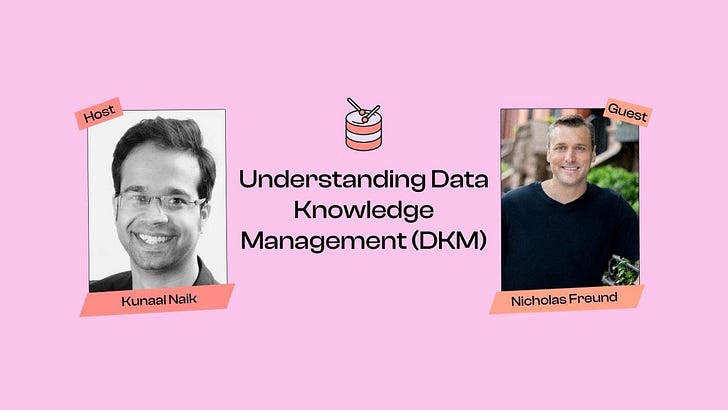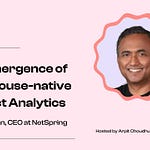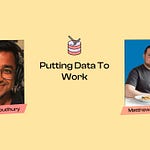What exactly is data knowledge management or DKM? What kind of companies need it and why? And how is it different from setting up a data catalog?
Nicholas Freund who is building a DKM solution at Workstream has some answers.
This episode is hosted by Kunaal Naik, a community member, data science coach, and YouTuber.
Can you please take out 2 minutes to share your preferences and make Data Beats more valuable for everyone? I’d really appreciate the help!🙏
Let’s dive in:
Q. What is Data knowledge Management or DKM?
From my perspective, data knowledge management allows people throughout a business or a company to get more out of data analytics and reporting assets.
It’s a single place to access the assets, consume training and knowledge, and ultimately collaborate with others throughout the business.
Q. Do companies need both a DKM solution and a data catalog?
Data knowledge Management is fundamentally different for a couple of reasons:
DKM fundamentally integrates the data consumption layer of the stack, whereas a data catalog is fundamentally built around the data warehouse.
With regards to jobs to be done and the users who use a DKM solution, it's much more about empowering business users by letting them utilize the analytics assets that have been already created.
Therefore, the majority of DKM users live within your CX/product/sales org rather than folks building out analytics for themselves.
Q. Can you briefly describe how one can maximize their value in using a DKM solution?
When it comes to the tipping point for when an organization might want to introduce a DKM solution into their environment, there are two vectors:
First is the number of data assets and analytics assets that are out there within an environment that lead to questions like, “What should we be looking at and what should we trust?”
Secondly, there are more and more tools that teams are using to consume data and it's no longer just a BI tool or one-off spreadsheets. Data is being pushed into all sorts of solutions such as product analytics tools, engagement tools, and operational systems.
And with more systems there's more sprawl, right?
And as organizations get through that entropy tipping point, that’s when folks would say, “We're really experiencing some acute problems here, so let's introduce a Data Knowledge Management solution”.
Q. Are there any prerequisites in terms of the data stack for companies to derive value from a DKM solution?
You can think of the value in terms of the ROI of your team's time, which translates into money and opportunity cost, and a DKM can help collapse the time spent training and enabling the organization.
With regards to the prerequisite, a DKM solution is more of a year-two type of purchase.
You're not going to purchase a DKM solution right after setting up Snowflake, for instance — the best time to introduce it is after the organization has really adopted the data stack it and that transition to entropy is starting to take place.
Absolutely!
Q. So which industries will need a DKM faster than any other industry?
We see a fit amongst the early adopters of the modern data stack — technology companies, retail, media, lots of direct-to-consumer companies, and generally speaking, companies that have achieved some level of complexity and scale
Q. Last question — what's your advice for companies evaluating a data cataloging or knowledge management solution?
I’d just think about the most acute problem that the organization is experiencing — which relates both to what the business is and how the analytics function has been set up.
If an organization is focused on the true pain points it’s experiencing, and implements a solution to solve those pain points, they’re going to be in great shape.
You can also tune in on Spotify or Apple Podcasts.
Prefer watching the interview?
What would you like to see next from Data Beats?
Data Beats provides high-quality educational content for free and while that’s not going to change, I want you to derive more value from what we do.
So let me know your preferences and help the community grow! 🤝












Share this post